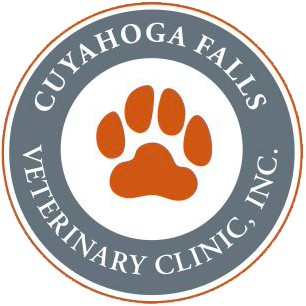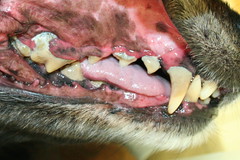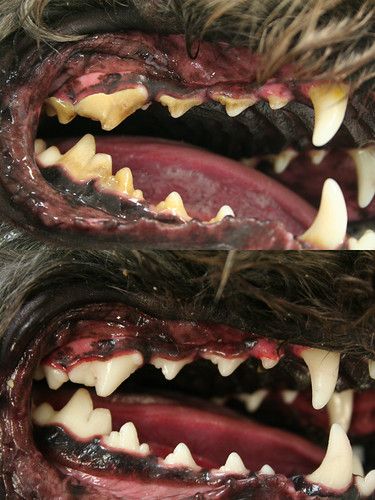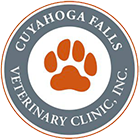There are some dogs and cats that are very fortunate in certain areas of their lives. Take cats for instance. How many times have you seen the same cat jump all over the house, from one landing to the next, and never suffer the slightest injury. These cats are “orthopedically fortunate.” And consider the Bassett Hound that never has ear troubles (yes, some do exist!). Talk about a fortunate dog!
On the flip side, there are some very unfortunate dogs and cats. One of the areas in which we find many unfortunate pets is in the world of oral health. While some animals seemingly never need to have their teeth cleaned, others develop trench-mouth in a short period of time. We know that it is frustration to see dental tartar accumulation mere months after a professional dental cleaning. What these events tell us is that these particular patients, in addition to the professional cleanings that they need, also require ongoing, long-term home dental care to preserve the health and comfort of the mouth.
Joining us for this post is Dr. Fraser Hale, DVM, FAVD, DipAVDC. All of those fancy letters mean that he is a board-certified veterinary dental specialist and is most qualified to speak on the topic at hand. While the photos our ours, the following text is what Dr. Hale shares with his clients at his veterinary dental practice in Guelph, Ontario, Canada.
Any of us (dogs, cats, people) that have teeth are at risk of developing periodontal disease. To prevent periodontal disease, many things must happen.
|
I brush my own teeth two to three times a day. I floss between my teeth every day. I see my dentist and hygienist for a professional evaluation and cleaning every nine months (what our group insurance plan covers for adults). It is not a matter of brushing & flossing my teeth OR having regular professional dental care. It is a combination of BOTH – daily plaque control at home and regular professional care.
Why do we need both? The simple answer is because neither works on its own. To understand this, we must understand the causes of gingivitis and periodontal disease. What follows is a highly simplified explanation of very complex conditions.
Gingivitis (inflammation of the gum tissue) and periodontitis (inflammation of the deeper tissues around the roots of the teeth) are caused by an invisible slime of bacteria that forms initially on the crowns of the teeth and in time will extend below the gum line to the roots. This slime is a biofilm and is specifically known as dental plaque.
Immediately after a professional dental cleaning, the tooth surfaces should be as clean as a whistle. Within hours (not days or weeks or months, but hours), plaque is already starting to accumulate on those freshly cleaned surfaces. When you brush your teeth at night, they are clean. When you wake up in the morning, they are wearing fuzzy little sweaters. That is the plaque that accumulates overnight as you sleep. That is how fast this all happens.
|
Early plaque is a thin film and oxygen can penetrate it well, so the bacteria in immature plaque are aerobic bacteria which tend to be relatively harmless. If the plaque film is removed mechanically on a daily basis, it does not progress beyond that stage. On the other hand, if the plaque is left undisturbed, it grows ever thicker, oxygen cannot penetrate all the way through and so much more harmful anaerobic bacteria start to predominate. Within as little as a few days, the mature plaque film can start to accumulate minerals from the saliva to form hard dental tartar. While immature plaque can be fairly easily disrupted mechanically (tooth brush, special diets, appropriate chew treats), once the plaque becomes mineralized to tartar, it is much harder to remove.
With that understood, you can see why it is important to have a daily plaque control program in place between professional dental treatments. Otherwise, the benefits of the professional dental cleaning are lost within a short space of time.
But if the home care is good, why the need for professional dental care at all? Quite simply, no home care program, no matter how well it is devised and applied, will be 100% effective. Though I brush and floss daily and I enjoy good gingival/periodontal health, my hygienist always finds areas where plaque and tartar have managed to accumulate. These are areas that are hard for me to reach with the brush and floss and areas that are hidden from view. So we combine daily home care to slow the build up with regular professional care to clean up those areas that have managed to accumulate plaque anyway.
While daily tooth brushing remains the most effective (when done properly) means of controlling plaque and maintaining good gingival health, there are a number of products that can also be of benefit. Unfortunately, there are also a number of other products that claim to be of benefit yet have no credible evidence to back their claims. Therefore, we highly recommend using products that have been awarded the Veterinary Oral Health Council Seal of Acceptance and specifically those products that have the seal for helping to control plaque. Visit www.vohc.org to learn more about the VOHC and for a list of accepted products.
One final note. Homecare is for the prevention of disease and should ONLY ever be started in a mouth that we know to be clean, healthy and free of pain. Home care can NOT treat established disease and in many cases will cause considerable pain if the attempt is made. This includes tooth brushing and the use of any dental diets and treats. Step one is assess and treat any dental disease. Step two is establish a daily plaque control program after healing to maintain oral health.
Dr. Hale was so thorough, I don’t have much to add here. Call us today at 330-929-3223 to set up a visit for us to examine your pet’s mouth and determine what treatment plan is best for your pet.




debbie rich
Pip had his teeth cleaned on monday. What are product names i can use to help keep them clean? Where would i get them? Thanks
Dr. Ryan Gates
Brushing the teeth is the most important thing, but there are a number of products that have come on the market since this post was written. Products approved by the Veterinary Oral Health Council (vohc.org) are the best use of your resources, and a list of them can be found on the website linked here. Look for the VOHC seal on the packaging. A list of the variety can be found on their website (some Greenies, a type of Milk Bone, , and a number of them are on the shelves of local pet stores. Others you can find on Amazon or other reputable vendors.
Keep in mind that if a product doesn’t have the VOHC seal but claims to help with dental health may be in the process of gaining approval, or it may have attempted and failed. If you have a question about a specific product, bring it to our (or another veterinarian’s) attention and we can help you determine if it is a good purchase for you and your pet.